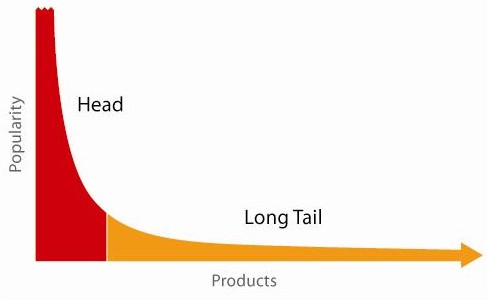mdst_110 / 2007_fall / week_10

how strange! this graph also models my attention span for the duration of a two-hour lab session!
agenda
-
discussion: is this a new economic age?
-
preparing for revised project statements : due wed. nov. 7 by 9 pm
-
group work on projects
-
for next week
keywords
links
1337;
all your base are belong to us;
bert is evil;
bonsai kitten;
dancing baby;
ellen feiss;
First post;
mc hawking;
more cowbell!;
star wars kid;
subservient chicken;
tourist guy
questions from lecture
1. can power law distributions present problems for democracy or capitalism? how do power law distributions serve to reinforce themselves and what does this mean for our economy?
2. is it accurate to describe the web as a supplement to mainstream journalism?
what qualities/sources does the web offer that might be lacking in mainstream media more generally?
3. as a consumer do you think that such diversity in choice is actually good for you? do you think it could force you to make an uneducated decision, if you don't
know specifics about a single product in relation to its competitors?
4. is it possible that people make a distinction between two spheres of choice? does having many choices in the realm of consumption really make people ignorant of their status as citizens?
5. clay shirky suggests of top bloggers that "stars exist not because of some cliquish preference for one another,
but because of the preference of hundreds of others pointing to them," arguing that "their popularity is a result of
the kind of distributed approal that it would be hard to fake." is he right?
6. what does it mean for a blog to be influential? should page views matter as much or more than external links?
7. do blogs like john marshall's talkingpointsmemo and glenn reynolds's instapundit seem relevant to your own concerns?
8. netflix may make economic sense, but does it make ecological sense?
9. is the internet prone to the phenomenon of payola that shaped the radio industry?
questions from readings
1. in anderson's investigation into media niches, he found that the more non-mainstream media companies like itunes, netflix, and amazon offered, the more
consumers bought them. he later remarks, "if the twentieth-century entertainment industry was about hits, the twenty-first will be equally about niches" (16).
do you think that the public is gearing more toward niches? how much of this is due to digital media, and how much of it is simply due to an expanding economy?
2. anderson mentions that the long tail provides an oppurtunity for "micro-hits" to occur. do you agree that there could ever truly be "400 top 40s," or do
you think that "the hit" will always exist?
3. does the long tail have the same impact on the movie industry that it has on the music industry and the book trade, or is it somehow less relevant where hollywood is concerned?
4. "make everything available" and "help me find it" (217): is this the best model for a digital business?
5. which seems like the better business model for the sale of music content: hybrid (analog and digital) or pure digitial?
6. is it true that the internet affords "increased exposure to other people" (191) or is that one of the grand myths of digital culture? how is digital culture altering civic and national culture? is the shift from association by geography to association by affinity weakening national identity and/or the public sphere?
7. how have you personally benefitted from the power of the long tail?
8. what's up with all the memes that anderson mentions? what do they tell us about digital media?
9. do you think 3d printers (225) will take off in the next few decades, or is this technology a mere fad?
10. are you convinced by anderson's arguments for the importance of the "long tail"?
11. anderson suggests that this new way of doing business will change the economy forever, but doesn't this seem reminiscent of the internet boom that was going to change economics forever also? what possible limitations could keep the "long tail" from changing the world as we know it?
1. is wu correct to suggest that anderson's theory of the long tail is overextended and misapplied in certain cases? which cases?
do you think there are any parts of the economy that it can never work in? which ones?

